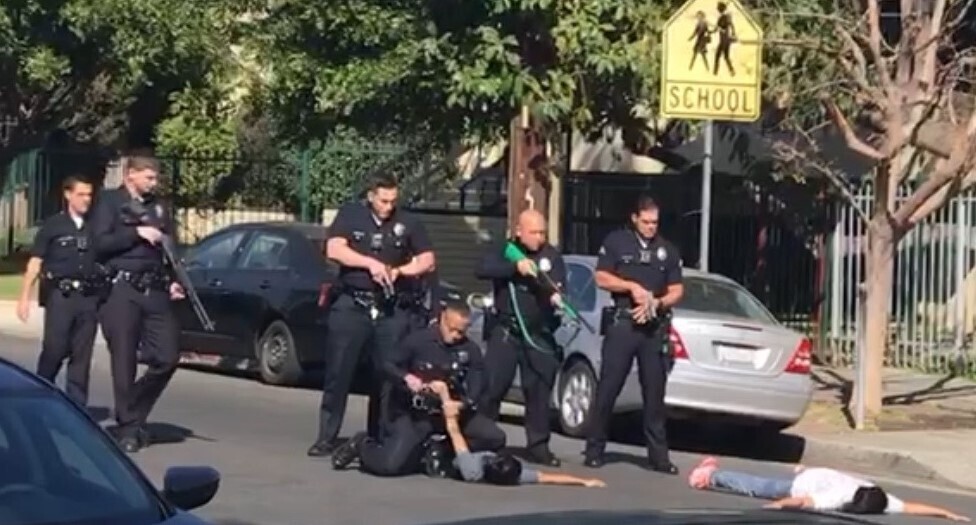[ad_1]

Film production coordinator Shibani Balsaver rented a U-Haul truck to move her possessions to a new apartment last year with the help of her friend Sheilnee Sen and set off driving east of Hollywood.
As she neared her new home, more than 10 Los Angeles police officers with their guns drawn stopped the vehicle and surrounded the two women inside, as an LAPD helicopter hovered. With their firearms aimed at the pair, officers ordered Balsaver to drop the key out the window and then for her and Sen to get out of the cab. They forced the two to lay facedown in the street, a video of the incident shows.
The officers kept their guns trained on the two women spread-eagle on the pavement during the Feb. 8, 2020 incident.
A bystander captured the video showing two large male officers putting their knees on the back and one put his right knee on Balsaver’s neck as the women were handcuffed. The officers had mistakenly believed the truck was stolen.
The two women are now suing the department in federal court for violating their civil rights by using illegal and violent “high-risk tactics” during what should have been a routine traffic stop.
“I felt terrified,” Balsaver, 31, said in an interview. “I thought the officers were going to shoot and kill me. There were a lot of officers with guns.”
She said she at first had no idea what was happening but she was shaking as an officer placed “a lot of weight down on me” while she was on the ground.
Sen said when she saw the officer point a gun at her, she began to panic. “My heart was beating so hard that it felt like it was to jump out of my chest.”
The suit accuses officers of following an official LAPD policy that allows them to treat traffic stops for non-violent property crimes, such a suspected stolen vehicle, as situations warranting high-risk tactics, including the pointing of guns.
Police officials declined to comment, citing the ongoing litigation.
In 2014, the U.S. Ninth Circuit Court of Appeal declared such high-risk tactics unconstitutional in nonviolent offenses. But attorney Brian Olney said the LAPD’s defiance of that court decision continues to terrify innocent people such as Balsaver and Sen with unlawful practices.
“A photo speaks a thousand words. Do these two women look like they are a threat? And yet the police officers have their guns drawn pointed right at them,” Olney said of the images of the incident. “This was how Shibani was introduced to her neighbors.
“The courts have ruled these tactics create a de facto arrest that violates the 4th Amendment, but the LAPD continues to ignore the law,” Olney said. “The truck was not stolen. It was an LAPD failure to train its officers that created the life-threatening situation.”
The U-Haul truck had once been reported stolen but was recovered and repeatedly rented out before Balsaver rented it. According to the lawsuit, in the aftermath, LAPD Sgt. Jeannette Pelayo of the Hollywood station told the women the department had failed to train its officers on new computer codes to distinguish between formerly stolen vehicles and current stolen ones.
Balsaver said the sergeant told them she’d be “very upset if it was her mother or sister it happened to, but she never apologized.” She said she hopes the lawsuit ends such behavior by the LAPD. “This absolutely should not happen,” she said. “I really feel like they treated us like we were guilty. I realize now this happens on a daily basis.”
Olney added: “The sergeant just explained, ‘We did everything according to policy.’”
The officers also forced Sen at gunpoint to open the back of the truck and reveal what was inside. Officers, according to the suit, without any probable cause, searched Balsaver’s personal possessions.
The women were freed once officers were able to confirm the U-Haul was not stolen. “They could have simply asked to see the receipt for the rental when they approached the cab, and all this would not have been necessary,” Olney said.
The lawsuit identifies Officer Jonathan Jarvis as one of the officers involved, saying he jammed his left knee into Balsaver’s back and his “right knee into the back of her head and neck, pressing her face into the pavement as he handcuffed her.”
The 2014 case limiting the use of stops stems from a May 2009 incident in which a San Francisco sergeant did a high-risk stop on a 47-year Black woman after an automatic license plate reader misread her Lexus license plate as matching that of a stolen vehicle. The Ninth Circuit found that a stolen car report in itself does not mean a driver presents a threat to justify the tactics in the stop.
[ad_2]
Source link